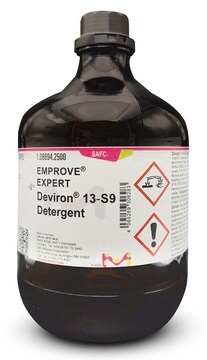MAB8257B
Anti-Influenza A Antibody, nucleoprotein, clone A1, biotin-conjugated
clone A1, Chemicon®, from mouse
Sign Into View Organizational & Contract Pricing
All Photos(1)
About This Item
UNSPSC Code:
12352203
eCl@ss:
32160702
NACRES:
NA.41
Recommended Products
biological source
mouse
Quality Level
conjugate
biotin conjugate
antibody form
purified immunoglobulin
antibody product type
primary antibodies
clone
A1, monoclonal
species reactivity
human
manufacturer/tradename
Chemicon®
technique(s)
immunofluorescence: suitable
isotype
IgG2a
shipped in
wet ice
Specificity
Specific for the Influenza A nucleoprotein. Has stronger binding with N1-type Flu A. Has been shown to react with the H5N1 strain. No cross reactivity seen to influenza B or other respiratory viruses.
Immunogen
Epitope: nucleoprotein
Influenza A
Application
Detect Influenza A using this Anti-Influenza A Antibody, nucleoprotein, clone A1, biotin-conjugated validated for use in IF.
Immunofluorescence
Optimal dilutions must be determined by end user.
Optimal dilutions must be determined by end user.
Research Category
Infectious Diseases
Infectious Diseases
Research Sub Category
Infectious Diseases - Viral
Infectious Diseases - Viral
Physical form
Biotin conjugated purified immunoglobulin. Liquid in 0.01M PBS, pH=7.1, 0.1% Sodium Azide with 15 mg/mL BSA as stabilizer.
Storage and Stability
Maintain at 2 to 8°C for up to 12 months from date of receipt. Protect from Light.
Other Notes
Concentration: Please refer to the Certificate of Analysis for the lot-specific concentration.
Legal Information
CHEMICON is a registered trademark of Merck KGaA, Darmstadt, Germany
Disclaimer
Unless otherwise stated in our catalog or other company documentation accompanying the product(s), our products are intended for research use only and are not to be used for any other purpose, which includes but is not limited to, unauthorized commercial uses, in vitro diagnostic uses, ex vivo or in vivo therapeutic uses or any type of consumption or application to humans or animals.
Not finding the right product?
Try our Product Selector Tool.
Storage Class Code
12 - Non Combustible Liquids
WGK
WGK 2
Flash Point(F)
Not applicable
Flash Point(C)
Not applicable
Certificates of Analysis (COA)
Search for Certificates of Analysis (COA) by entering the products Lot/Batch Number. Lot and Batch Numbers can be found on a product’s label following the words ‘Lot’ or ‘Batch’.
Already Own This Product?
Find documentation for the products that you have recently purchased in the Document Library.
Roozbeh Abedini-Nassab et al.
Micromachines, 12(7) (2021-07-03)
Magnetic nanoparticles have attracted significant attention in various disciplines, including engineering and medicine. Microfluidic chips and lab-on-a-chip devices, with precise control over small volumes of fluids and tiny particles, are appropriate tools for the synthesis, manipulation, and evaluation of nanoparticles.
Felix Broecker et al.
NPJ vaccines, 4, 31-31 (2019-07-26)
Current seasonal influenza virus vaccines only provide limited, short-lived protection, and antigenic drift in the hemagglutinin surface glycoprotein necessitates their annual re-formulation and re-administration. To overcome these limitations, universal vaccine strategies that aim at eliciting broadly protective antibodies to conserved
Sergey Yegorov et al.
Cell reports. Medicine, 3(2), 100509-100509 (2022-03-05)
The induction of broadly neutralizing antibodies (bNAbs) that target the hemagglutinin stalk domain is a promising strategy for the development of "universal" influenza virus vaccines. bNAbs can be boosted in adults by sequential exposure to heterosubtypic viruses through natural infection
Mehfuz Zaman et al.
Clinical & translational immunology, 10(9), e1337-e1337 (2021-09-17)
The upper respiratory tract is the major entry site for Streptococcus pyogenes and influenza virus. Vaccine strategies that activate mucosal immunity could significantly reduce morbidity and mortality because of these pathogens. The severity of influenza is significantly greater if a
Eda K Holl et al.
Proceedings of the National Academy of Sciences of the United States of America, 113(35), 9728-9733 (2016-08-17)
Nucleic acid-containing debris released from dead and dying cells can be recognized as damage-associated molecular patterns (DAMPs) or pattern-associated molecular patterns (PAMPs) by the innate immune system. Inappropriate activation of the innate immune response can engender pathological inflammation and autoimmune
Our team of scientists has experience in all areas of research including Life Science, Material Science, Chemical Synthesis, Chromatography, Analytical and many others.
Contact Technical Service



